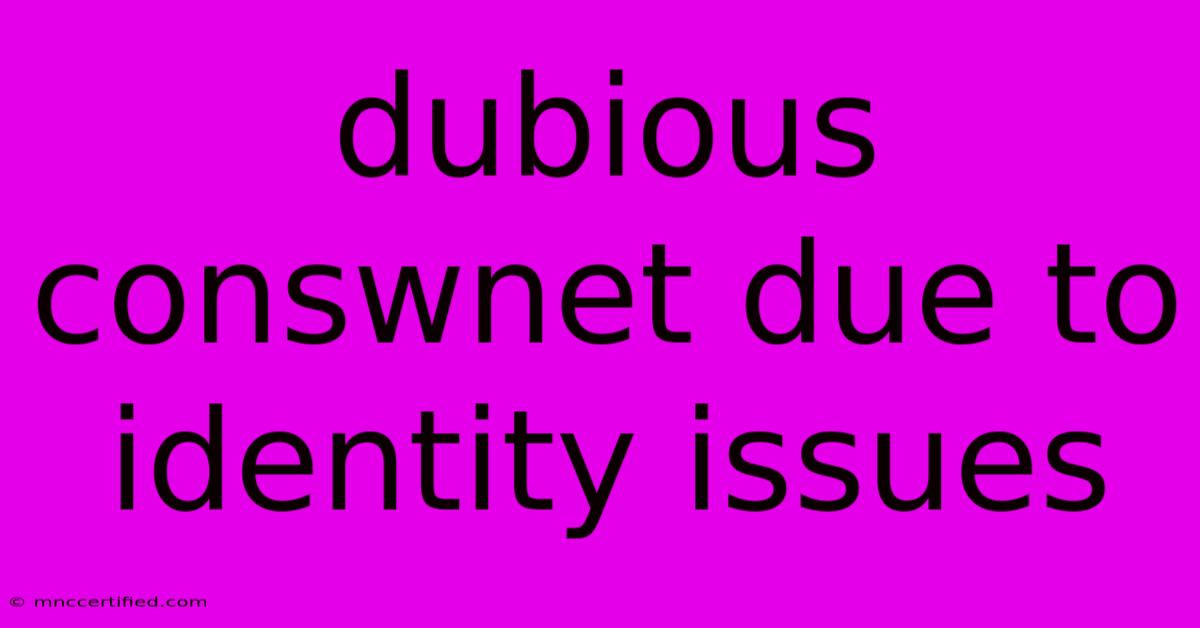Dubious Conswnet Due To Identity Issues

Table of Contents
Dubious Consent: Navigating the Complexities of Identity and Consent Online
In the digital age, where online interactions are increasingly prevalent, the concept of consent takes on new and complex dimensions. One particularly thorny issue is the question of dubious consent, particularly when it comes to individuals grappling with their identities, especially online. This article explores the complexities of this issue, examining how identity struggles can lead to situations where consent is unclear, and exploring the ethical implications of navigating these delicate situations.
The Interplay of Identity and Consent
Understanding the link between identity and consent requires acknowledging the multifaceted nature of both concepts.
- Identity: Identity is a fluid and ever-evolving construct. It's not static but rather a dynamic process shaped by personal experiences, social interactions, and cultural influences. For many, particularly those exploring their identities, this process can be fraught with uncertainty and confusion.
- Consent: Consent, at its core, is about free and informed agreement. It requires clear understanding, agency, and the ability to freely choose.
When identity struggles intertwine with online interactions, the dynamics of consent become intricate. Individuals grappling with their gender identity, sexual orientation, or other aspects of their self-perception may find themselves navigating a digital landscape that doesn't always reflect their lived experiences. This can lead to situations where:
- Misrepresentation: Individuals might present themselves online in ways that don't fully align with their internal understanding of themselves. This can arise out of fear of judgment, a desire to explore different facets of their identity, or simply a lack of clarity.
- Misinterpretation: Others may misinterpret online cues, leading to assumptions about someone's identity that don't reflect their true self.
These situations can create a grey area for consent. For example, someone might engage in online activities under a username or avatar that doesn't fully represent their true identity. If they then engage in activities that involve physical intimacy, the question of consent becomes complicated. Was consent given freely and knowingly, or was it based on a misunderstanding of the individual's true identity?
Ethical Considerations and Navigating the Gray Areas
The ethical implications of dubious consent are profound. We are tasked with navigating a delicate balance between:
- Respecting Individual Autonomy: Individuals have the right to explore and express their identities, even if these explorations are fluid or involve experimentation.
- Protecting Vulnerable Individuals: It's crucial to safeguard individuals who may be particularly vulnerable to exploitation due to their identity struggles or uncertainties.
- Promoting Transparency and Open Communication: Clear communication and transparency are essential to ensure that consent is truly informed and freely given.
Navigating these gray areas requires sensitivity, empathy, and a commitment to ethical conduct. Here are some considerations for navigating online interactions when identity complexities are involved:
- Emphasize Open Communication: Encourage open and honest conversations about identity and expectations.
- Focus on Mutual Respect: Respect the individual's self-identified identity, even if it's in flux.
- Prioritize Transparency: Be transparent about your own identity and intentions.
- Exercise Caution with Sensitive Information: Avoid sharing personal information or engaging in activities that involve intimacy until there's a clear understanding of each other's identities.
Building a More Inclusive Online Environment
Ultimately, addressing the issue of dubious consent necessitates creating a more inclusive online environment that fosters understanding, respect, and open dialogue. This involves:
- Educating Users about Consent: Promote awareness about the importance of consent and its complexities in the digital age.
- Supporting Identity Exploration: Create safe spaces for individuals to explore and express their identities without fear of judgment or exploitation.
- Promoting Open Communication: Encourage platforms and communities to foster environments where communication about identity and consent is encouraged.
By actively addressing these issues, we can move toward a more equitable and inclusive online landscape where consent is truly informed and respected, regardless of an individual's journey of self-discovery.

Thank you for visiting our website wich cover about Dubious Conswnet Due To Identity Issues. We hope the information provided has been useful to you. Feel free to contact us if you have any questions or need further assistance. See you next time and dont miss to bookmark.
Featured Posts
-
Todays Bengals Vs Ravens Game Channel And Time
Nov 08, 2024
-
Rudy Pankow Outer Banks Cast Reaction
Nov 08, 2024
-
Kimmels Tearful Trump Victory Reaction
Nov 08, 2024
-
American Heritage Insurance Services Gap
Nov 08, 2024
-
Bengals Vs Ravens Live Score Updates
Nov 08, 2024